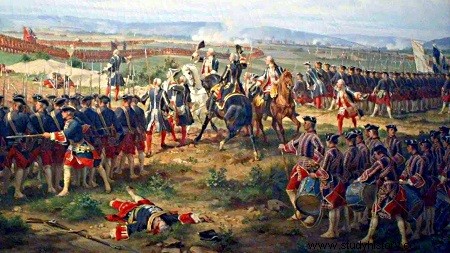
The situation of the French troops seems desperate. The Marshal of Saxe, greatly concerned, asked the king to withdraw with the Dauphin, fearing the imminence of a total overflow. Louis XV, confident - he was also a very good man of war - replies:"I am sure that he (Saxony) will do what is necessary... I remain at my post.
From then on, the Marshal saw no salvation except in a violent counter-offensive by the cavalry, directed against the flanks of the English column which had now completely broken the French front. The cavalry rushed on the enemy, but their charges broke on an indestructible English "mass", repelling, by the mere fact of its cohesion and the formidable synchronization of its heavy fire, the scattered groups which tried to open a breach. .
Disarray is at its height in the ranks of the French. Marshal de Saxe, despite his infirmity, continued to traverse the theater of operations, which was now strewn with hundreds of dead and wounded; many officers of the French general staff perished. The English continue to progress, pushing with their 14,000 men a good part of the French army towards the rout.
Dismayed, the Marshal of Saxe witnesses the French defeat...
The charges of his cavalry, despite his intrepidity, break on the "infernal column".
The defeat of France seems consummated. The beginning of the afternoon passed in a series of ineffective offensives by the French squadrons.
The English seemed to be endowed with an indestructible force; Saxe later explained the unshakable aspect of the enemy column:"As long as the enemy had not taken Fontenoy, his successes in the center were disadvantageous to him, since he lacked
d' a point of support. The more he marched forward, the more he exposed his troops to being taken by the French he left behind.
It was therefore essential to support it by repeated charges, which moreover gave time to prepare the general attack. »
From then on, unable to contain the enemy thrust, Saxe tried to exploit it to his advantage. By letting it stretch in length, therefore resisting it only weakly in its progression, it will make the "infernal column" more vulnerable, and it will no longer offer this impenetrable shell that nothing could break.
The plan is excellent, of course, but it still needs to be carried out.
While Saxony and the king's staff, monarch at the head, are considering all the possibilities likely to turn the situation, on the ground, the French regiments continue to break on the bulk of the English troops. Already, at several points on the front, ammunition is running out. The Marshal of Saxe, once again, begs the Duke of Harcourt to persuade the king and his son to move away from the battlefield. It would have been enough for the Dutch to take the French troops posted between Fontenoy and Antoing from the rear for the day of May 11, 1745 not only to have been a crushing French military defeat, but also for Louis XV to have risked, as
at the battle of Poitiers which he mentioned a few hours earlier, to find himself, like Jean le Bon, a prisoner of the English.
For the moment, nothing is yet lost; but we must act quickly.
